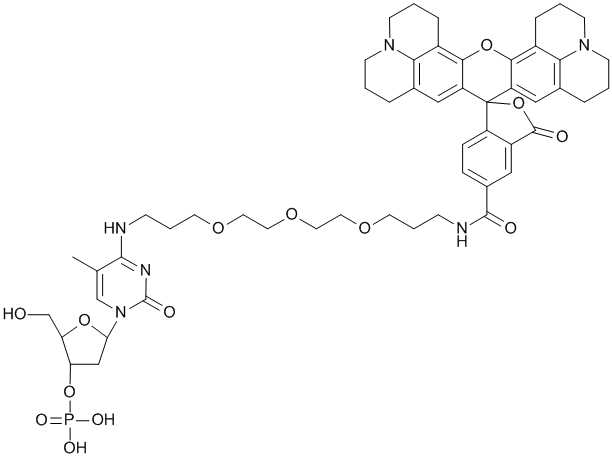ROX, a member of the rhodamine family, is routinely used as a passive reference dye to provide a stable baseline for the fluorescent reporter dyes, i.e SYBR Green I or TaqMan probes, in multiplex qPCR or real-time PCR. The baseline also allows the correction of pipetting errors, fluorescence fluctuations, and instrumental drift such as change of lamp intensity output over time. As the dye does not interfere qPCR amplification, a constant amount is added to all samples as a control. Dependant on the filter and real-time PCR instrument used during experiments, concentration of ROX may need be to be adjusted.
Earlier real-time PCR instruments did not have filter matching ROX and thus high concentrations were needed to establish the baseline. With the ROX dye being compatible with all PCR instruments, the later instruments are now calibrated for ROX spectral settings and thus removes the need to re-calibrate the thermal cycler. With an excitation/emission maxima of 586 and 610, the dye has a different emission spectrum compared against the SYBR Green I or TaqMan probes, making it ideal to be used with our BHQ-2 quencher. Compared to the fluorescein family of dyes, rhodamine dyes are more resistant to photo bleaching and stable over a wider pH range.
|
Synthesizer
|
Column
|
Type/Description
|
Notes
|
|
MerMade 6,12
|
MerMade, syringe (all scales)
|
Pipette type column
|
A MerMade column is also known as a Supercolumn
|
|
MerMade 4, 48X, 96E, 192E, 192X
|
MerMade, Syringe (up to 1.3 mL)
|
Pipette type column
|
A MerMade column is also known as a Supercolumn
|
|
ABI 384 / 394
|
Luer
|
Barrel column with luer fitting at either end
|
Also known as ALL-FIT or Standard
|
|
Expedite 8909
|
Luer
|
Barrel column with luer fitting at either end
|
Also known as ALL-FIT or Standard
|
|
ABI3900
|
MerMade
|
Pipette type column
|
A MerMade column is also known as a Supercolumn
|
|
K&A H4, H8, H8SE, H2, H32, H64
|
Luer
|
Barrel column with luer fitting at either end
|
Also known as ALL-FIT or Standard
|
|
K&A S4CL/S8CL
|
Luer
|
Barrel column with luer fitting at either end
|
Also known as Standard. For this instrument, we recommend the Luer (Standard) column as the ALL-FIT columns have a wider barrel.
|
|
Dr Oligo 48
|
MerMade
|
Pipette type column
|
A MerMade column is also known as a Supercolumn
|
|
Dr Oligo 192XLc, 768XLc just plates
|
MerMade, Syringe (up to 1.3 mL)
|
Pipette type column
|
A MerMade column is also known as a Supercolumn
|
|
OligoMaker X12, 48, 192, X192, X96
|
MerMade, Syringe (up to 1.3 mL)
|
Pipette type column
|
A MerMade column is also known as a Supercolumn
|
